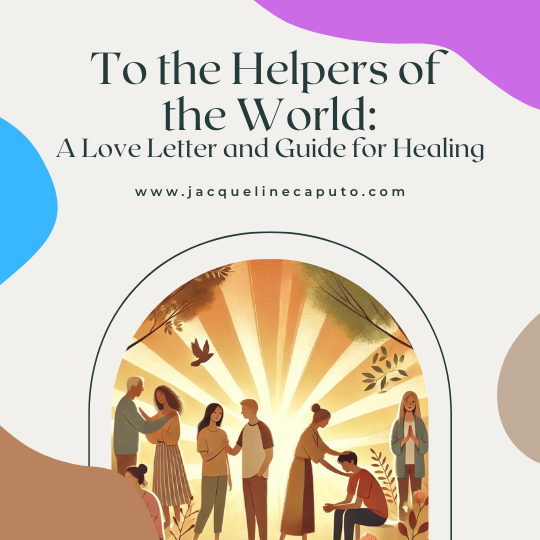This is dedicated to the helpers of the world—those who work tirelessly, often quietly, to support others. In times of crisis and hardship, Mr. Rogers reminded us of something simple yet powerful: “Look for the helpers. You will always find people who are helping.” This message is as important today as ever, not just for those looking for hope but for the helpers themselves, who deserve care, acknowledgment, and support.
To the Helpers of the World: A Love Letter and Guide for Healing
To everyone who shows up every day with open hearts and open hands—to therapists, doctors, nurses, teachers, parents, caregivers, advocates, and friends who give so much to make life better for others—this is for you. Often, the weight of the world feels heavy, and the endless pull to help can make it easy to lose yourself along the way. Remember, as you take on the mantle of healing and supporting others, you too deserve to feel held, nourished, and uplifted.
Here are some thoughts and reminders, woven with compassion and care, to help you keep going and remember your worth and strength.
1. You Are Allowed to Ask for Help Too
Helpers can sometimes feel like they’re only “strong” when they carry everything alone. But strength is also found in allowing others to support you. Letting others hold and care for you isn’t a weakness—it’s an act of courage. Just as you advise those you help, let yourself lean on someone else. Whether it’s a friend, partner, colleague, or therapist, reaching out doesn’t mean you’re failing. It means you’re human, deserving of the same care you give.
2. Look for the Helpers Who Lift You Up
As Mr. Rogers reminded us, the world is filled with helpers. Surround yourself with people who lift you up, whether through words of encouragement, shared laughs, or simple companionship. When your heart feels heavy, connect with others who understand, who see you, and who give you the space to feel your feelings. Remember, even helpers need helpers.
3. Give Yourself Permission to Rest
Helper fatigue is real. You may feel a constant drive to be “on” for others, but you deserve time to rest and recharge. Self-compassion is not only a gift to yourself but also a way to sustain your ability to care for others. Whether it’s a quiet morning with tea, a day off from responsibilities, or simply time spent in solitude, rest is essential. It’s okay to step away, take a break, and nurture yourself first.
4. Find Beauty in Small Moments
When the world feels overwhelming, find joy in the little things—a sunrise, the laughter of a friend, the softness of a blanket. Helpers often witness the heavier sides of life, so reconnecting with these moments of simple beauty can be a balm for the heart. Allow yourself to savor these small joys, to stay grounded in the present, and to find light in the quiet moments that give you peace.
5. Give Yourself the Same Compassion You Give Others
You extend endless compassion to others—extend it to yourself too. Mistakes, setbacks, and struggles don’t make you less worthy; they make you human. Talk to yourself the way you would talk to a friend. Remind yourself of your worth, your resilience, and your inherent goodness. Practice self-compassion as fiercely as you offer it to others.
6. Embrace the Healing Power of Community
Community is a gift for helpers. Find those who understand your journey, who share your values, and who know the complexities of giving. Whether it’s through professional networks, support groups, or close friends, having a community allows you to feel seen, understood, and valued. Share your stories, your struggles, and your victories with those who can relate—they will help remind you why you chose this path in the first place.
7. Protect Your Boundaries
Helping can be deeply fulfilling, but it’s also draining when boundaries blur. Remember, setting boundaries is a form of self-care that allows you to give from a place of fullness rather than depletion. Know that it’s okay to say “no,” to limit your time, and to protect your mental space. By honoring your boundaries, you sustain your capacity to help in a way that honors your own well-being.
8. Reflect on the Good You’re Doing
In the midst of challenges, it’s easy to feel like you’re not doing enough. Take a moment to recognize the impact you’ve made, no matter how small it may seem. Write down or remember the smiles you’ve created, the lives you’ve touched, and the hope you’ve inspired. Your kindness, compassion, and dedication matter, even when it feels like they go unnoticed.
9. Let Yourself Grieve
Helpers often absorb the grief of others, carrying a heavy emotional load. You are allowed to feel that grief, to acknowledge its weight, and to honor it as part of your own healing. Grieving doesn’t make you weaker; it makes you real. Letting yourself mourn the pain, the losses, and the heartbreak you witness allows you to stay true to your emotions without losing yourself in them.
10. Love Deeply and Let Yourself Be Loved
Love is a gift you give freely to others—don’t forget to open yourself to receive it too. Love yourself with kindness, patience, and grace. Remember that, in giving so much, you are worthy of being loved, cherished, and cared for just as deeply.
In the words of Mr. Rogers, “Look for the helpers.” You are one of those helpers, making a difference, brightening lives, and creating hope in a world that so desperately needs it. Remember that the world is better because of you, and in return, allow the world to give back to you, to hold you, and to remind you that you, too, deserve all the kindness and compassion you give.
Thank you for all that you do, and thank you for being here—today, tomorrow, and always.
One last reminder:
What is true yesterday today and tomorrow:
This guide has been floating around and I thought it would be helpful to have it as a reminder. It’s not impossible to heal in a broken world.
Here are instructions on how to live in a broken world:
Lean into Community
Seek out love
Applaud the good you see
Keep paying attention
Talk to your neighbors
Dance to the music and embrace it all.
Look for love and small joys
Take breaks and relish and nourishing your own body
Linger at the dinner table with friends
Check on your people
Let yourself grieve
Love one another as deeply as you can

About the Author
Jackie Caputo is a Licensed Marriage and Family Therapist who provides therapy in Woodland Hills, CA. She also provides online therapy in California to individuals throughout the state.

